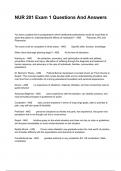Exam (elaborations)
NUR 201 Exam 1 Questions And Answers
- Course
- NUR 201
- Institution
- Jersey College Of Nursing
You have a patient that is postoperative which healthcare professionals would be most likely to assist the patient in understanding the effects of medication? - ANS Physician, RN, and Pharmacist The nurse must be competent in three areas: - ANS Specific skills, function, knowledg...
[Show more]



